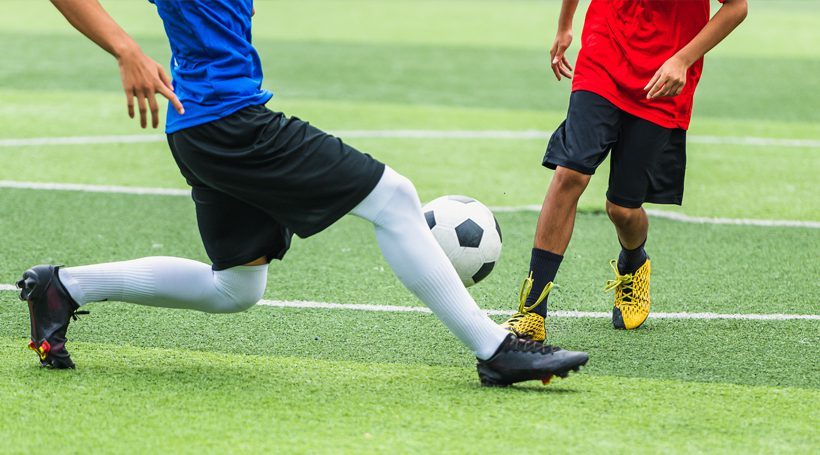Imagine playing on the field at your state championship soccer game when the goalie suddenly drops behind you. The ball is nowhere near. There’s no goal to save. He just drops.

Daniel Tarditi, DO
“I didn’t know something like that could happen until my brother’s teammate had a cardiac arrest on the field. He was a sophomore in college,” says Daniel Tarditi, DO, on the medical staff of Jefferson Health – New Jersey and a member of The Heart House. “He had warning signs leading up to it – heart racing, shortness of breath, he even passed out a few times. But the school doctors brushed it off, saying, ‘You’re probably stressed, drinking too much and not getting enough sleep. It’s nothing to worry about.’ They didn’t know at the time he had a genetic predisposition for a cardiac arrest.”
When you’re young and healthy, it’s easy to feel like nothing could ever go wrong. Until it does. Sudden cardiac death is the most common medical cause of death in athletes, according to recent studies. Often, it’s from an underlying condition the athlete wasn’t even aware they had.
Symptoms like fainting, racing heartbeat, severe shortness of breath, dizziness and chest discomfort are critical signs that it’s time to be evaluated. The problem is that these symptoms can be easily written off as typical side effects of “pushing yourself” for your sport.

Mario Caruso, DO
That’s where cardiac screenings come in handy, especially for student athletes who are otherwise healthy but have a family history of cardiac disease, says Mario Caruso, DO, a member provider with the Cooper and Inspira Cardiac Care network, and a sports and exercise clinical cardiologist at Cooper University Health Care.
“We typically find conditions like heart muscle disease, artery disease or inherited abnormalities,” says Caruso. “Parents don’t typically think to talk about these things until much later in life – your dad’s history of atrial fibrillation isn’t likely to come up at the Thanksgiving table – but it’s useful information at any age.”
Although there’s no definitive age when these symptoms might occur, they’re more likely to show as kids get older – into their mid-to-late teens and early 20s – as this is the age most athletes hit the peak of their career in high-intensity sports.
“It’s important to note, though, that the sport doesn’t cause these cardiac conditions,” says Caruso. “If someone were more sedentary and less likely to elevate their heart rate for prolonged periods, they may go undiagnosed for longer.”
But just because someone is diagnosed with an underlying cardiac condition doesn’t mean they’re done with sports forever.
“In the past, the cardiology field was very cautious, probably because some high-profile professional athletes had catastrophic cardiac events,” Caruso says. “But as we move forward, there’s more data, evidence and information that we can obtain to more accurately determine an individual’s risk and put them in a more appropriate activity.”
“Often, it just takes a different type of care,” Caruso adds. “We’ll talk to patients about safe ways to exercise and the warning signs to look out for.”
When you’re young and healthy, it’s easy to feel like nothing could ever go wrong. Until it does.
Cardiac activity has 3 risk levels: mild, moderate and severe risk of having a cardiac event while playing sports. Some sports have a higher risk than others, although that varies from person to person.
Broadly speaking, Caruso says, the sports with the most cardiac arrests are those with high-intensity activity, like basketball, football and soccer. Level of play is also a factor – a division 1 athlete will perform at a different intensity than a division 2.
Risk-reducing measures also take place off the field. Athletes can mitigate risk by making sure they’re adequately hydrated, eating enough before games and taking appropriate breaks when needed – all things that, if not done, can lead to cardiac events even if you don’t have an underlying condition, says Tarditi.
“As students get into their college careers, we talk more seriously about the risk factors behind alcohol and illicit substances,” he says. “Alcohol can be a natural irritant to the heart muscle and cause irregular heartbeats. Other stimulants, like Adderall or steroids, can also put you at a much higher risk.”
But while there are ways to screen for possible conditions and mitigate risk, it’s important to be prepared in case a cardiac emergency does emerge on the field.
“We recently got a glimpse of this at the professional level with Damar Hamlin,” Tarditi says referring to the Buffalo Bills player whose heart stopped during an NFL game last month. “90% of people who experience cardiac arrests outside the hospital don’t survive. He was able to recover because someone did CPR right away, and they had an AED, or an External Defibrillator, on hand within minutes of his collapse. These devices aren’t new, and you don’t have to be an expert to use them. All you do is hook them up, and it determines what type of shock is needed for you.”
“There’s no reason why student programs, especially at the college level, should not have these on hand,” he adds.
For parents, there are plenty of ways to get involved.
“First, the easiest thing you can do is learn CPR,” says Tarditi. “More than 65% of Americans say they’re trained in CPR, but less than 1 in 5 actually are up to date with their training.”
Then, ensure your child’s program has the equipment they need. Ask the school: Do you have an AED? Where is it? Is it charged? Is it in a locked room where no one can get to it in an emergency?
“These cases are rare, but they do happen, and it’s important to be prepared,” says Tarditi. “The more serious your child gets in their sport, the more you need to advocate for their health and safety on the field.”














